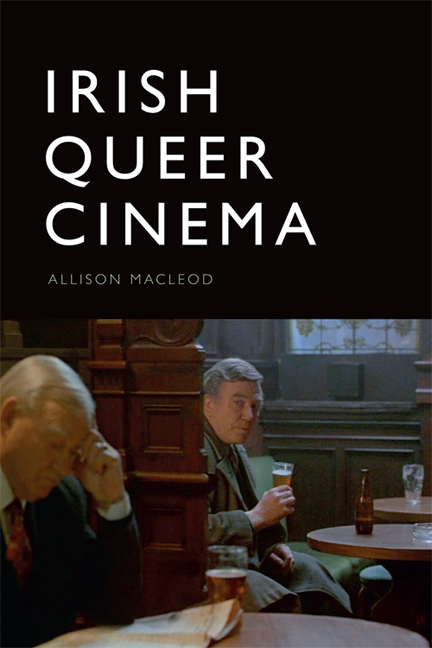Book contents
- Frontmatter
- Contents
- List of Figures
- Acknowledgements
- 1 Queerly National and Nationally Queer: Paradoxes of an Irish Queer Cinema
- 2 Mapping Ireland’s Queer Films
- 3 Re-imagined Kinship and Failed Communities
- 4 The Contested Space of the Irish Pub
- 5 Compartmentalised Cosmopolitans and Rigid Fluidity
- 6 The Queerly Productive Constraints of Rural Space
- 7 Queer Mobilities and Disassociated Masculinities
- 8 Contested Belongings within Diasporic Space
- 9 The Irish Queer Short Film
- 10 Concluding Remarks
- Select Filmography
- Bibliography
- Index
7 - Queer Mobilities and Disassociated Masculinities
Published online by Cambridge University Press: 04 May 2021
- Frontmatter
- Contents
- List of Figures
- Acknowledgements
- 1 Queerly National and Nationally Queer: Paradoxes of an Irish Queer Cinema
- 2 Mapping Ireland’s Queer Films
- 3 Re-imagined Kinship and Failed Communities
- 4 The Contested Space of the Irish Pub
- 5 Compartmentalised Cosmopolitans and Rigid Fluidity
- 6 The Queerly Productive Constraints of Rural Space
- 7 Queer Mobilities and Disassociated Masculinities
- 8 Contested Belongings within Diasporic Space
- 9 The Irish Queer Short Film
- 10 Concluding Remarks
- Select Filmography
- Bibliography
- Index
Summary
Globalisation and a changing European socio-geographical space have produced new spatialities and subjectivities associated with deterritorialisation, delocalisation and transnational mobility. Within the Irish cultural imagination, national identity has historically been defined in relation to placehood and landscape, with a rooted sense of place and control over land representing Ireland's evolution from an experience of colonial oppression to a post-colonial assertion of independence. Yet the increasing global mobility of people, information and capital and the emergence of transnational organisations such as the European Union (EU) have created new geographies of belonging and exclusion that work to redefine the national and put into flux the idea of Ireland itself. These new mobilities have been accompanied by a postmodern identity politics that privileges fluidity: ‘if the modern “problem of identity” was how to construct an identity and keep it solid and stable, the postmodern “problem of identity” is primary how to avoid fixation and keep the options open’ (Bauman 1996: 17).
This chapter explores how I Went Down (Breathnach 1997), The Disappearance of Finbar (Clayton 1996) and Breakfast on Pluto (Jordan 2005) construct such a postmodern ‘problem of identity’ through tropes of mobility. All three films are structured by journey narratives that trace the queer characters’ movements as they negotiate their identities in relation to shifting social and spatial structures. As ‘being is replaced by becoming’ (Aitken and Lukinbeal 1997: 353), the mobile queer subject experiences a crisis of identity linked to their physical and psychic disassociation from stable referents of identity associated with placehood. Through such crises of identity these films reveal the liberatory potential of mobility to release the queer subject from the social and spatial restraints of placehood and to reconfigure Irish identity outside of national paradigms. Here, queer mobility operates as a disruptive position of alterity that challenges hegemonic structures and social norms, and reveals identity to be in flux and fundamentally unstable.
All three films posit movement and mobility as central to the constitution of sexual and gender subjectivities. Increased mobility within and between nations has been cited as key to the social and political mobilisation of LGBTQ communities by fostering connections across borders and within urban centres.
- Type
- Chapter
- Information
- Irish Queer Cinema , pp. 109 - 127Publisher: Edinburgh University PressPrint publication year: 2018



